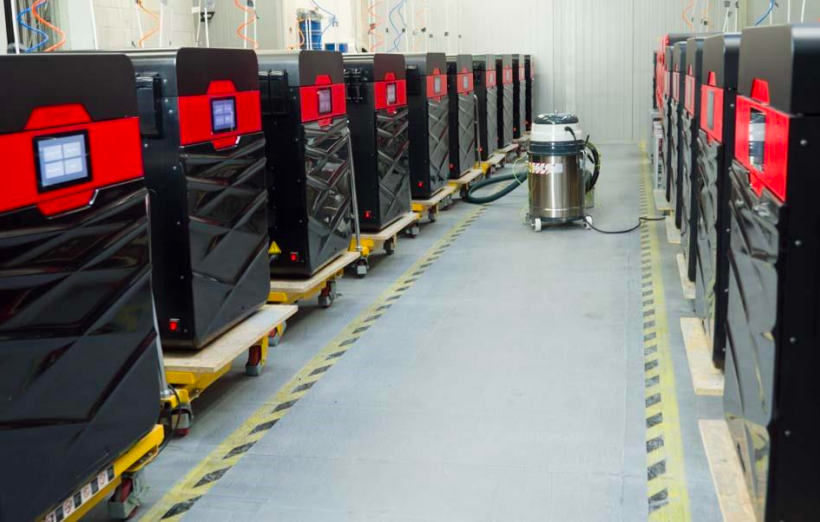3D printing startup PrintPlace and Selective Laser Sintering (SLS) printer manufacturer Sinterit have collaborated to 3D print an electronic social distancing device.
‘Maggy’ is a small wearable gadget that’s designed to help people uphold the social distancing guidelines that were introduced in response to the ongoing COVID-19 pandemic. Working alongside a companion app, the device creates a sound and vibration notification whenever the distance between its users becomes too small, alerting them to return to a safe distance. Following a surge in orders, Maggy’s creators Gumption Group, turned to PrintPlace and Sinterit’s 3D printing technology to enable it to meet the increased demand.
‘The virus doesn’t just stop at the border. All over the world, companies and governments are looking for solutions so that people can return to work safely. Maggy offers a great solution,” said Bart Embrechts, Managing Partner of Gumption Group. ‘We have already seen a huge amount of interest in Maggy. Orders have been coming in thick and fast, our phones have been ringing off the hook.”
The Maggy social distancing device
Maggy can function independently, but operates best when combined with an optional mobile phone app. Working alone, the gadget’s bluetooth 5.1 and 5.2 chips only have an accuracy of 10 to 15 cm. Standard smartphone bluetooth chips meanwhile, have a reach of up to 1 to 2 meters, thus using the app drastically enhances Maggy’s usability.
In addition to its mobile version, Maggy comes with a desktop web platform, which offers contact tracing functionality. Designed to be used by companies in the workplace, the program allows managers to monitor the social distancing compliance of their workforce, and swiftly react in case of an infection.
The personal device is also secure, with no registration necessary, even on the app, and no user details are stored. Within a workplace setting, the device can therefore be handed out to visitors and employees without requiring companies to consider data protection legislation. According to PrintPlace, the gadget’s battery also lasts five consecutive days without needing to be charged, making it a convenient option for reopening businesses.
Before Maggy’s commercial release, it was also entered into the EU Commission’s EUvsVirus Hackathon. The competition focused on tackling the challenges of COVID-19 in 37 fields, with the aim of bringing the resulting solutions to the European market quickly. No fewer than 2,160 candidates from all over Europe took part, and Maggy managed to win in the category of ‘Business Continuity, Protecting Employees’.

PrintPlace and Sinterit’s 3D printing partnership
After the initial product announcement, Maggy’s creators were overwhelmed by more than 45,000 orders for the gadget which were placed by businesses from its native Belgium. In order to meet this surge in demand, and create the necessary custom-built PCBs and other components, the company turned to PrintPlace.
Gumption Group needed to organize short-term limited scale beta tests to effectively bridge this production gap, and PrintPlace offered the ideal entry point into 3D printing for the firm. PrintPlace’s SLS printers not only provided the freedom to design complex and detailed parts, but also allowed Gumption to access additive manufacturing in a more cost-effective way than investing in industrial units.
The start-up provided 3D modelling and development guidance to Maggy’s creators with the aim of producing prototypes and entering short run production. In order to meet the high level of dimensional accuracy and surface finish required, both businesses worked closely with SLS 3D printing specialist Sinterit. The company provided support on optimal LISA Pro build preparation, ideal machine setup and maintenance, and post-processing.
Maggy has now entered serial production, with the device commercially available for purchase from the company’s website, starting at €40.
Sinerit’s SLS 3D printing expertise
Founded in 2014 and based in Krakow, Poland, Sinterit is known for its LISA range of desktop 3D printers. The company has launched a number of updates to its systems in recent years, including the LISA 1.5 and its most recent LISA PRO machine, which launched in December 2018.
Sinterit has also entered into a series of partnerships with the aim of expanding on the applications of its technology. Working with 3D designer Bartłomiej Gaczorek, the company 3D printed a mask that filters out polluted air on a Sinterit Lisa SLS 3D printer. The headgear, aimed at younger users, was designed with Autodesk Netfabb software before being printed using multiple materials.
Later in 2018, Sinterit released a case study demonstrating the effective use of its SLS technology to produce a piece of firefighting equipment. The 3D printed component was created as a demonstration of the abilities of SLS, which reportedly cut down the design workflow “dramatically.”
You can now nominate for the 2020 3D Printing Industry Awards. Cast your vote to help decide this year’s winners.
To stay up to date with the latest 3D printing news, don’t forget to subscribe to the 3D Printing Industry newsletter or follow us on Twitter or liking our page on Facebook.
Looking for a job in the additive manufacturing industry? Visit 3D Printing Jobs for a selection of roles in the industry.
Featured image shows the Maggy social distancing device. Image via Sinterit.
"device" - Google News
August 03, 2020 at 06:58PM
https://ift.tt/2Xm6yxy
PrintPlace partners with Sinterit to 3D print 'Maggy' social distancing device - 3D Printing Industry
"device" - Google News
https://ift.tt/2KSbrrl
https://ift.tt/2YsSbsy
Bagikan Berita Ini














0 Response to "PrintPlace partners with Sinterit to 3D print 'Maggy' social distancing device - 3D Printing Industry"
Post a Comment